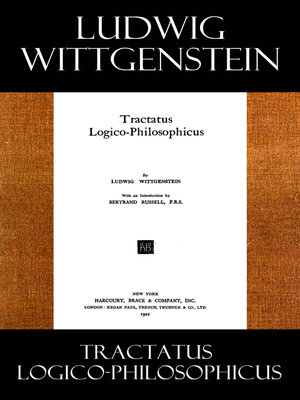Tractatus Logico-Philosophicus (The original 1922 edition with an introduction by Bertram Russell)
ebook
By Ludwig Wittgenstein

Sign up to save your library
With an OverDrive account, you can save your favorite libraries for at-a-glance information about availability. Find out more about OverDrive accounts.
Find this title in Libby, the library reading app by OverDrive.



Search for a digital library with this title
Title found at these libraries:
| Loading... |
This carefully crafted ebook: "Tractatus Logico-Philosophicus (The original 1922 edition with an introduction by Bertram Russell)" is formatted for your eReader with a functional and detailed table of contents. The Tractatus Logico-Philosophicus is the only book-length philosophical work published by the philosopher Ludwig Wittgenstein in his lifetime. It was an ambitious project: to identify the relationship between language and reality and to define the limits of science. It is recognized as a significant philosophical work of the twentieth century. Wittgenstein wrote the notes for Tractatus while he was a soldier during World War I and completed it when a prisoner of war at Como and later Cassino in August 1918. It was first published in German in 1921 as Logisch-Philosophische Abhandlung. Tractatus was influential chiefly amongst the logical positivists of the Vienna Circle, such as Rudolf Carnap and Friedrich Waismann. Ludwig Josef Johann Wittgenstein (1889 – 1951) was an Austrian-British philosopher who worked primarily in logic, the philosophy of mathematics, the philosophy of mind, and the philosophy of language. He published few works in his lifetime, including one book review, one article, a children's dictionary, and the 75-page Tractatus Logico-Philosophicus (1921).






